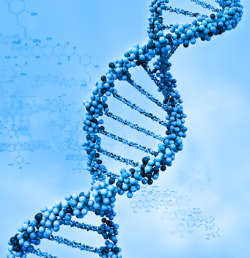Cancer treatment could benefit from a major new discovery in DNA
Published 23 Jul 2018 • Updated 23 May 2019 • By Louise Bollecker

Major positive implications for cancer treatment could be on the horizon as scientists have made a discovery about how cells repair broken strands of DNA.

Published in Nature Today, the study found a brand new protein complex in cells that shields broken DNA and controls the way in which it is repaired. The highlight for scientists is its potential in the world of cancer treatment.
This new complex pushes cancer cells to use a particular type of DNA repair system that is vulnerable to targeting by new drugs called PARP inhibitors or platinum-based chemotherapies.
Known as the ‘Shieldin’ complex, it was found to be important for generating the right type of antibodies during an immune response and mutations which could lead to immune-related disorders.
What does this new discovery mean for cancer treatment?
The discovery was made by a research team comprising scientists from the University of Toronto, Canada, The Institute of Cancer Research, London, UK, The Netherlands Cancer Institute and the University of Bern, Switzerland.
It could lead to tests to direct and monitor treatment for patients with mutations in BRCA1, BRCA2 or other DNA repair genes, treated with platinum-based chemotherapies or new drugs called PARP inhibitors.
What do PARP inhibitors do?
PARP inhibitors take advantage of a major vulnerability of some cancers – a weakness in the ability of cancer cells to repair their DNA.
When intact, the Shieldin complex was found to contribute to this vulnerability by attaching to the broken DNA, forcing cancer cells to attempt to repair their DNA in a way that makes them susceptible to PARP inhibitors and platinum chemotherapies.
But when mutations are introduced in the components of the complex, researchers found that cancer cells grown in the lab and in mice used an alternative way to repair DNA and quickly became resistant to PARP inhibitors.
The PARP inhibitor drug olaparib is approved in the US and Europe to treat ovarian and breast cancers with BRCA mutations, with promising outlooks for the treatment of some prostate cancers.
Dr Justine Alford, from Cancer Research UK, said: “PARP inhibitors are an important treatment for some people with cancers caused by faulty BRCA genes, but unfortunately they don’t work for everyone. This study is helping scientists to further their understanding of why this might be and could one day have implications for the clinic.
“If proven in people, not only could this information help pinpoint people who might not benefit from these drugs, sparing them from treatment that likely won’t work, but it could also identify people who may benefit from a different treatment. Ultimately, we need more research like this to help make treatment even more precise.”
How important is a complex for DNA repair?
Professor Chris Lord, Professor of Cancer Genomics at The Institute of Cancer Research, London, explained: “Our DNA is constantly damaged and repaired. Our ability to repair that DNA is crucial to keep cells alive and to prevent diseases such as cancer.
“Our study reveals for the first time a complex that is crucial for DNA repair. Mutated versions of the complex could allow cancer cells to become resistant to exciting new PARP inhibitor drugs as well as some types of chemotherapy.
“We next need to show that these mutations actually occur in patients and are clinically important. If that’s the case, we should be able to test for these mutations as a way of monitoring treatment and spotting early signs of resistance.”
Health Europa

 Facebook
Facebook Twitter
Twitter


